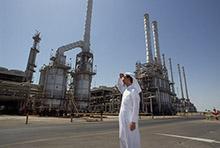
Typical street scene in Santa Ana, El Salvador. (Photo: iStock)
IMF Survey : Saudi Arabia’s Strong Growth Offers Chance to Tackle Jobs Challenge
July 24, 2013
- Growth outlook remains positive, oil market the main risk
- Saudi Arabia continues to play key stabilizing role in global oil market
- Reforms to focus on growth and employment while maintaining stability
Saudi Arabia’s economy continues to perform well, with growth of 5.1 percent in 2012, thanks to high oil prices and output, strong private sector growth, and government spending, say IMF economists.

Oil refinery at Ras Tanura, Saudi Arabia: The country has played a stabilizing role in the global oil market in recent years (photo: Jacques Langevin/Corbis)
ECONOMIC HEALTH CHECK
In its latest annual assessment of Saudi Arabia, the IMF says that while growth is likely to slow to 4 percent in 2013 as oil output declines relative to last year, activity in the private sector will remain healthy.
“The outlook for Saudi Arabia’s economy remains positive,” said Tim Callen, IMF mission chief for Saudi Arabia. “The country should continue to take advantage of this opportunity to create jobs, address housing shortages, develop the small and medium-sized enterprise sector, and further strengthen the fiscal position.”
The main risk to the outlook stems from the oil market, although the government has prudently used the period of high oil prices to build substantial fiscal buffers, which provide plenty of scope to smooth government spending over the medium term in the event of a decline in oil prices.
Contributing globally, focusing domestically
One of the best performing of the Group of Twenty leading industrial and emerging market economies, Saudi Arabia has supported the global economy in recent years through its stabilizing role in the global oil market. Increased oil production in 2011 and 2012 helped prevent supply disturbances elsewhere from having a detrimental impact on global growth. The government has also provided significant financial support to other Middle Eastern countries.
In addition to playing an important global and regional role, the IMF report notes, Saudi Arabia also needs to focus on domestic reforms to reap the benefits and address the challenges being created by its young and growing population.
• Creating employment. A large number of young people will enter the labor market in the next decade and beyond, and creating a sufficient number of rewarding jobs for them in the private sector will be a challenge. The authorities are thus giving priority to labor market policies aimed at improving skills and raising private sector employment of Saudi workers.
• Housing an expanding population. Urbanization and population growth in Saudi Arabia have boosted demand for housing. The lack of affordable housing saw a sharp increase in rents during 2007-11, which was one of the main drivers of inflation. Efforts to expand access to housing are appropriate and could make an important contribution to inclusive growth in the future, the report says.
• Taming domestic energy consumption. With a growing population, Saudi Arabia is likely to see domestic energy consumption rise sharply in the absence of policy reforms. While acknowledging that the government is taking steps to contain the growth of domestic energy demand and explore alternative sources of energy, the report notes that the authorities may need to consider planning for an upward adjustment in domestic energy prices.
Policies to maintain stability
The report says that Saudi Arabia will need to continue to maintain macroeconomic stability as it works toward long-term development goals. Ensuring that labor market policies are carefully coordinated with macroeconomic policies will be important in this regard. The government’s fiscal policy looks set to appropriately slow the pace of spending growth this year after large increases in 2011 and 2012. This will help contain demand pressures. Were signs of inflationary pressures to emerge, then either spending projects would need to be slowed or macroprudential policies tightened, or both.
Over the longer term, a reduction in the non-oil fiscal deficit is expected as infrastructure spending tapers off, but policy measures on the revenue and expenditure sides of the budget will still be needed to further strengthen the fiscal position and increase savings for future generations.
The IMF report also suggests that, from a position of strength, now is a good time to implement fiscal reforms to strengthen the budget process and ensure the quality of government spending to achieve development goals. In particular, moving to a multiyear budgeting framework that formally incorporates the impact of oil price volatility and integrates the five-year National Development Plans would help strengthen budget formulation.
Measures to promote financial development should continue in step with ongoing reforms to strengthen financial sector regulation and supervision. Saudi Arabia was among the first countries to implement Basle III capital standards for the banking system, which is well capitalized, liquid, and profitable. With the passage of the new mortgage law, a regulatory and supervisory framework is being put in place for nonbank institutions entering the market.


